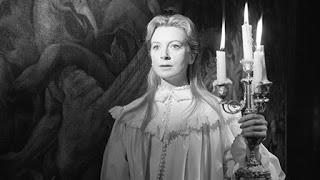 Jack Clayton's The Innocents (1961) offers a superb study in psychological terror. Adapting Henry James' The Turn of the Screw, it's unsettling in a way that few horror movies achieve.
Jack Clayton's The Innocents (1961) offers a superb study in psychological terror. Adapting Henry James' The Turn of the Screw, it's unsettling in a way that few horror movies achieve.Miss Giddens (Deborah Kerr) becomes the Governess of two recently orphaned children, Miles (Martin Stephens) and Flora (Pamela Franklin) at their Uncle's (Michael Redgrave) Sussex estate. Miss Giddens initially finds the children charming, but grows unnerved by Miles' precocious, flirtatious attitude. Then she learns about the gruesome fate of their uncle's valet Quint and the previous governess, casting the children's behavior in a disturbing light. Then she starts seeing ghostly figures around the estate...
It takes awhile for The Innocents to approach horror, the filmmakers allowing doubts, dark backstories and shadowy figures to fester in Miss Giddens' (and the viewer's) mind. Clayton and photographer Freddie Francis let terror to infiltrate the picturesque estate, using deep focus and murky shadows to throw interiors into terrorized relief. It's even worse when ghostly images begin manifesting in broad daylight, as when Flora sees the deceased governess standing in a millpond. This unnerving subtlety plays against more explosive scenes, like a dream montage or Miss Giddens' nighttime prowl punctuated by laughter and distorted echoes.
Writers William Archibald (adapting his play) and Truman Capote maintain James' ambiguity, often suggesting that it's less a ghost story than a tale of nervous breakdown. Miss Giddens arrives with no prior experience, with the Uncle gamely commenting that she's too pretty for a governess. Yet she also proves obsessed with "filth" and "corruption," She absorbs the children's weirdness and Mrs. Grose's (Megs Jenkins) tales of woe, suspecting every child's game, whispered conversation and billowing curtain as supernatural menace. Another great shot casts Giddens in a pavilion, having terrified Flora with her rantings, dressed in black as rain sweeps around her.
The open-endedness doesn't make the story any less disturbing: Miles sleepwalks, nurses dead pigeons and shares a quasi-romantic kiss with Giddens; Flora recites a mournful love song as if communing with spirits; omnipresent flowers, wreathed turtles and imposing statues frame an unnatural, crypt-like atmosphere. It moves into a unnerving climax in a greenhouse, where the governess tries to justify her behavior while accusing Miles of badness; the boy's preternatural calm unhinges her further. Then he starts cackling insanely with Quint's visage behind him...
Deborah Kerr wonderfully plays Giddens' unctuous exterior slipping into understated madness. Kerr plays the character with guarded intensity, allowing her mask to periodically slip for unhinged rants, stark terror and neurotic vulnerability. Martin Stephens, previously of The Village of the Damned, plays the role with precocious, knowing nastiness; Pamela Franklin seems more an innocent victim. Megs Jenkins plays an expositional role with guarded emotion.
What makes The Innocents work is that, despite its restraint and ambiguities, it carries all its neuroses near the surface. The climax builds to a whipsawing of insanity, accusations and sexual energy, culminating in a disarmingly quiet tragedy. The final shot, with Miss Giddens tearfully clasping Miles in the garden as a bird chirps, provides an anguished exclamation point.

